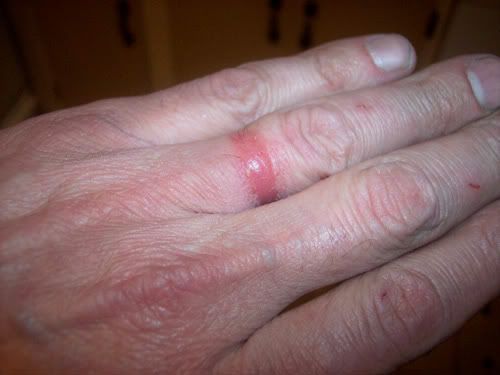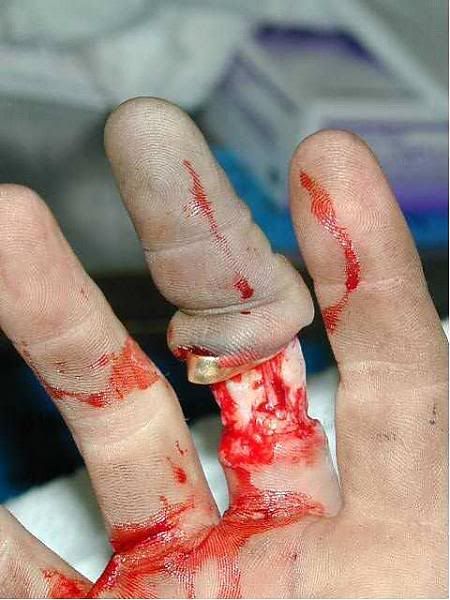Hello All,
The shop that I began in as an apprentice machinist was an engine rebuilding shop that took in just about anything from single cylinder engines to a V-8 Detroit Diesel power unit that was used to power the overhead ladle at our local Chevrolet Engine Plant Foundry, which was the largest project that I worked on. In my early days, like the first six months, the apprentices spent the entire day disassembling and degreasing all of the engine components. At this point, we were called 'gunkies'. The room that we worked in had an agitating caustic soda tank and a larger caustic soda spray washer as well as a solvent tank. Of course, we wore rubber gloves, aprons and safety glasses around the chemicals, but as you took the parts out of the tanks you always seemed to get drips of the chemicals on unprotected parts. The next step was to neutralize the caustic soda with a hot water bath and blow it dry with air. By the end of the day you were completely covered with grease, bits of carbon, rust and soaking wet. This cleaning process has changed for the better because the caustic soda tanks are not commonly used anymore due to the expense of disposing the spent chemicals. The tank has to be emptied and the water boiled off to reduce the waste to a solid.
Once your time was served as a 'gunkie' and the next victim was hired, it was a great job and I got to work with some great journeymen and eventually learned a great deal about machining and engine building. After all of the components are re-machined, they have to be impeccably cleaned to remove any traces of glass bead, steel shot from cleaning and chips from machining. This started with a bath in the 'Safety Kleen' tank and then a hot water and soap bath. Back then, no one used gloves for this and I didn't question it. Some days, it seemed like I was using this solvent most of the day when I was preparing to assemble a large engine. One great thing about this shop was that each machinist worked a project through from start to finish, inspecting it, then machining all of the components and finally assembling the engine. On some days, my hands and arms would be as if I had sunburn. Never thought much of it as everyone else did the same.
Two years ago I was diagnosed with bladder cancer and there is a good chance that some of my chemical misadventures from the 1980's played a significant role. Smoking while using these chemicals didn't help either. Good news is that it was caught early enough that it was removed and I have been scanned every three months since and am still fine. Chances are it will return, but they keep an eye on it.
Last Thursday, my wife decides that she wants to refinish the breakfast room maple table. I gently tried to explain exactly how much work would be involved. Undeterred, she decided she wants to do it. I keep my mouth shut and cheerfully help her along each step. After the second coat of polyurethane on one of the leaves, she tried to remove a large drip and sanded through the finish. No worries, I will strip the finish and get her back to the same point. I used a strong stripper with Methylene Chloride to remove the finish. I was wearing Nitrile gloves and using a scraper to remove the stripper and the finish when I felt my hands starting to burn. Apparently, Nitrile gloves were a big mistake as the stripper began melting them on my hands. So I removed the gloves and reached for that universal solvent--mineral spirits, to remove it as it was at hand. Another big mistake as I 'thinned' the stripper and worked it very thoroughly into my hands. Now it is 106 degrees F. outside and I only have a few minutes to finish the job at hand, so I finish removing the stripper and go to wash my hands ten minutes later with soap and water. I will spare you a picture, but my hands, fingers and forearms have hundreds of blisters. Fingers look like cucumbers. It is getting better slowly. I have a set of chemical resistant gloves that I use in my solvent tank, but didn't want to ruin them for this small , quick job as they cost $30.00. Moral of the story: You can't cut corners on safety. Even DIY products can be dangerous. I didn't see anything on the stripper's label to indicate what kind of gloves were 'chemically resistant', but I will double check that in the future.
Work safely always.
Regards,
Mike











































![MeshMagic 3D Free 3D Modeling Software [Download]](https://m.media-amazon.com/images/I/B1U+p8ewjGS._SL500_.png)




![DreamPlan Home Design and Landscaping Software Free for Windows [PC Download]](https://m.media-amazon.com/images/I/51kvZH2dVLL._SL500_.jpg)
















